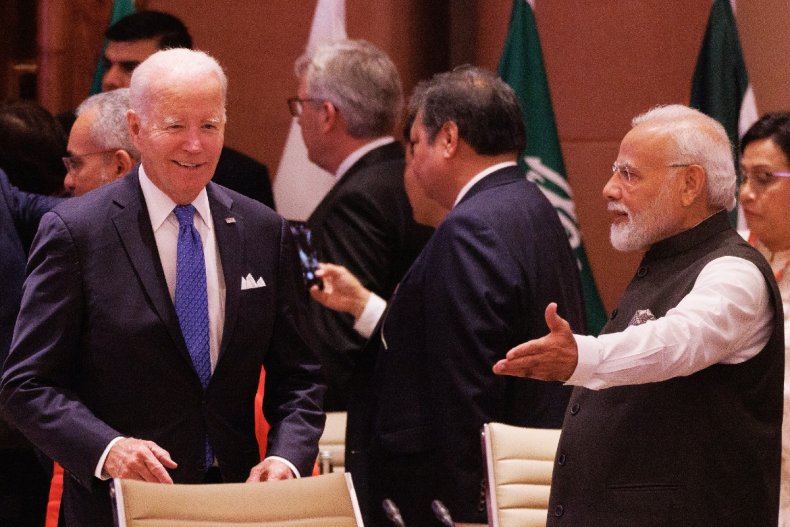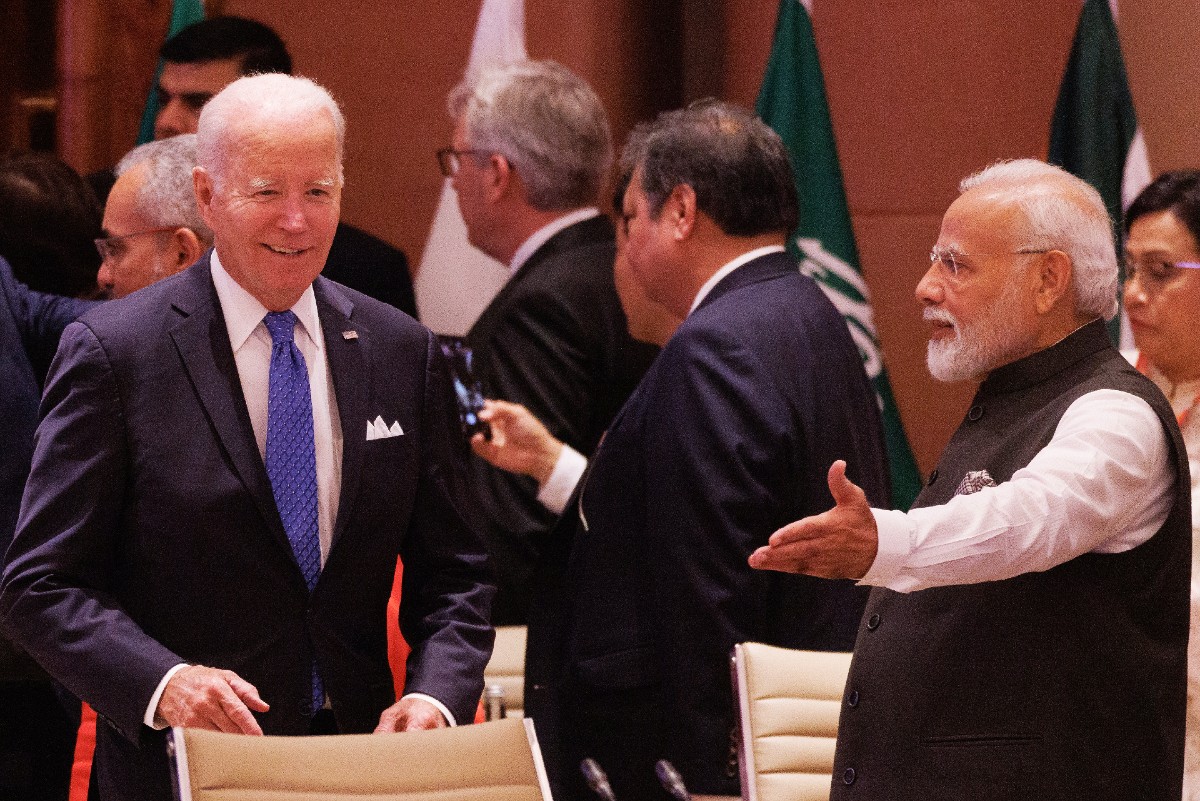This year’s G20 summit in India has drawn condemnation from Kyiv after its leaders’ declaration adopted a softer tone towards Russia’s invasion of Ukraine than last year’s document.
At several points in the consensus declaration, published during the summit in New Delhi, the phrasing of the 2023 document appeared to take a step back from the outright criticism of Moscow and its now 18-month-old invasion of Ukraine that shone through in the 2022 announcement.
The G20 attendees hold a wide range of opinions on the war in Ukraine, and although many Western countries have strongly denounced the conflict, the opinion is not shared among all member nations. Reports in the lead-up to the unveiling of the consensus document had suggested divisions between some states over Ukraine.

Dan Kitwood/Getty Images
A spokesperson for Ukraine’s Foreign Ministry, Oleg Nikolenko, said the document signed by the countries at the forum was “nothing to be proud of,” but added: “We are grateful to the partners who tried to include strong wording in the text.”
He attached an edited version of this year’s document, adding in references to Russia’s “aggression” and the war “against” Ukraine.
Russia’s Foreign Ministry said ahead of the summit that “since 2022, Western countries have consistently sought to put Ukraine on the G20 agenda,” and that Moscow would “work closely with all G20 countries to debunk the Western myth about Russia’s ‘aggressiveness.'”
The Prime Minister of Britain, Rishi Sunak, called the consensus document “a good and strong outcome,” with German Chancellor Olaf Scholz adding it was “a statement which supports the territorial and sovereign integrity of Ukraine.”
The consensus document “does a very good job of standing up for the principle that states cannot use force to seek territorial acquisition or to violate the territorial integrity and sovereignty or political independence of other states,” U.S. national security adviser, Jake Sullivan, told the media, according to Reuters.
This year’s leaders’ declaration called on all states to adhere to “the principles of international law, including territorial integrity and sovereignty, international humanitarian law, and the multilateral system that safeguards peace and stability.” The document, however, skirted around specifying Russia’s role in the 18-month-old conflict, only calling for “a comprehensive, just and durable peace in Ukraine.”
“All states must refrain from the threat or use of force to seek territorial acquisition against the territorial integrity and sovereignty or political independence of any state,” said the 2023 document that was presented by Indian Prime Minister Narendra Modi.
G20 adopted a final declaration. We are grateful to the partners who tried to include strong wording in the text. However, in terms of Russia’s aggression against Ukraine, G20 has nothing to be proud of. This is how the main elements of the text could look to be closer to reality pic.twitter.com/qZqYluVKKS
— Oleg Nikolenko (@OlegNikolenko_) September 9, 2023
However, after last year’s summit, held in Bali, Indonesia, the G20 said it “deplores in the strongest terms the aggression by the Russian Federation against Ukraine.”
The group said in November 2022 that it demanded Russia’s “complete and unconditional withdrawal from the territory of Ukraine.”
“Most members strongly condemned the war in Ukraine and stressed it is causing immense human suffering and exacerbating existing fragilities in the global economy,” the document continued last year.
Both documents do distance the G20 from a geopolitical role, emphasizing the overriding economic function of the forum.
“We designated the G20 [to be] the premier forum for global economic cooperation,” the Bali document said.
Using the same wording, the New Delhi document added that the G20 “is not the platform to resolve geopolitical and security issues.”
Both documents said the use of nuclear weapons is “inadmissible.”
Bali Declaration in 2022
This year, we have also witnessed the war in Ukraine further adversely impact the global economy. There was a discussion on the issue.
We reiterated our national positions as expressed in other fora, including the UN Security Council and the UN General Assembly, which, in Resolution No. ES-11/1 dated 2 March 2022, as adopted by majority vote (141 votes for, 5 against, 35 abstentions, 12 absent) deplores in the strongest terms the aggression by the Russian Federation against Ukraine and demands its complete and unconditional withdrawal from the territory of Ukraine.
Most members strongly condemned the war in Ukraine and stressed it is causing immense human suffering and exacerbating existing fragilities in the global economy—constraining growth, increasing inflation, disrupting supply chains, heightening energy and food insecurity, and elevating financial stability risks. There were other views and different assessments of the situation and sanctions.
Recognizing that the G20 is not the forum to resolve security issues, we acknowledge that security issues can have significant consequences for the global economy.
New Delhi Declaration, 2023
We note with deep concern the immense human suffering and the adverse impact of wars and conflicts around the world.
Concerning the war in Ukraine, while recalling the discussion in Bali, we reiterated our national positions and resolutions adopted at the UN Security Council and the UN
General Assembly (A/RES/ES-11/1 and A/RES/ES-11/6) and underscored that all
states must act in a manner consistent with the Purposes and Principles of the UN
Charter in its entirety. In line with the UN Charter, all states must refrain from the threat or use of force to seek territorial acquisition against the territorial integrity and
sovereignty or political independence of any state. The use or threat of use of nuclear
weapons is inadmissible.
Reaffirming that the G20 is the premier forum for international economic cooperation, and recognizing that while the G20 is not the platform to resolve geopolitical and
security issues, we acknowledge that these issues can have significant consequences for the global economy.
We highlighted the human suffering and negative added impacts of the war in Ukraine with regard to global food and energy security, supply chains, macro-financial stability, inflation and growth, which has complicated the policy environment for countries, especially developing and least developed countries which are still recovering from the COVID-19 pandemic and the economic disruption which has derailed progress towards the SDGs. There were different views and assessments of the situation.










